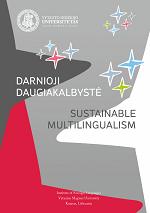Latin Language: a Contemporary Language for Contemporary Europe
Latin Language: a Contemporary Language for Contemporary Europe
Author(s): Andrea BerniniSubject(s): Cultural Essay, Political Essay, Societal Essay
Published by: Vytauto Didžiojo Universitetas
Keywords: European Union; linguistic policy; Latin language; linguistic equality
Summary/Abstract: As confirmed by some recent EU recommendations, all languages must have the same rights, according to the principle of equality. This situation requires huge costs and leads states and also civil society to look for other possibilities that are suitable for contemporary times. Today, we seem to have a choice between two kinds of multilingualism: an ‘articulated multilingualism’ based on three languages (English, French, German), and a ‘global bilingualism’ (English together with each national language). These two options imply a sort of discrimination in the EU, since they attach more importance to certain languages. Several solutions for a common European language have been proposed, but we have already a language able to satisfy the requirements of practicality, cost effectiveness and equality: Latin, which has been used in Europe for centuries as language of humanities and natural science, bureaucracy and law. We do not need a Ciceronian language, but a modern and up-to-date one, and the proof that Latin language can be suitable for today is provided by various contemporary examples. In the EU, Latin could be taught at school and spread by media, in order to become an administrative language and a language spoken by EU citizens as a lingua franca. This is mainly a provocative article, connected with the topic of equality in the EU linguistic policy.
Journal: Darnioji daugiakalbystė
- Issue Year: 2012
- Issue No: 1
- Page Range: 19-30
- Page Count: 12
- Language: English

